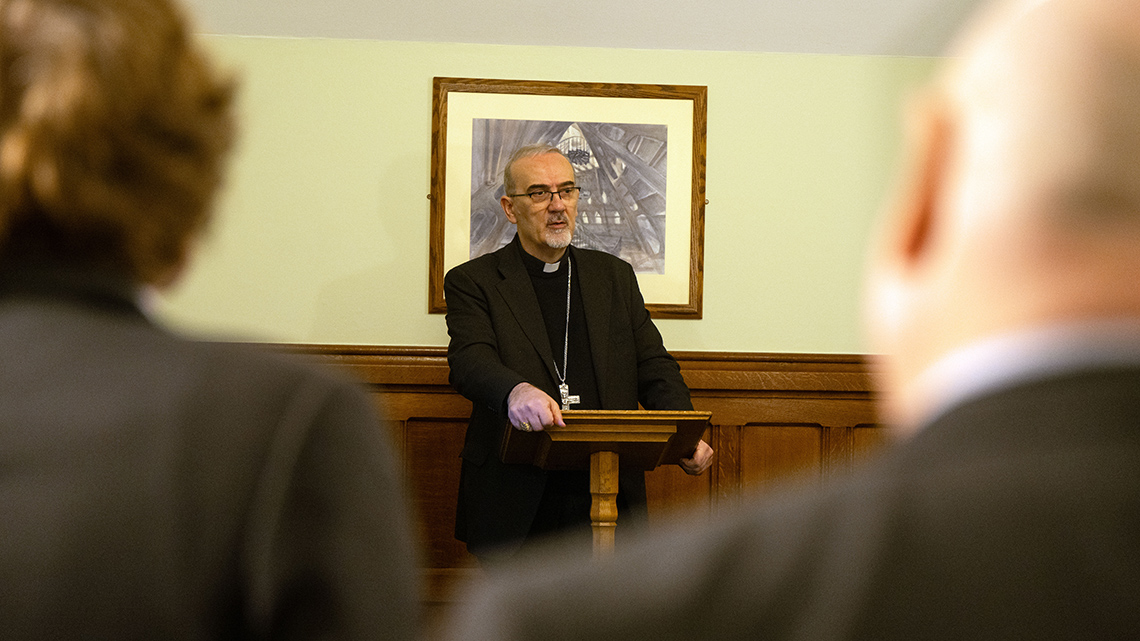
The Latin Patriarch of Jerusalem, His Beatitude Cardinal Pierbattista Pizzaballa OFM has met with MPs, peers, civil servants and representatives of charities working in the Holy Land at a special parliamentary reception at the Palace of Westminster.
Organised by the Bishops’ Conference, the reception took place on Thursday 28 November, and was co-hosted by Mary Glindon MP, who is a member of both Labour Friends of Israel and Labour Friends of Palestine and the Middle East, and Conservative MP Sir Edward Leigh, the longest-serving MP in the House of Commons.
The meeting was well attended by ecumenical and interfaith representatives – from the Church of England and Orthodox churches, to Jewish and Muslim guests.
Cardinal Pizzaballa updated those present on the tragic realities unfolding in the Holy Land but spoke of the need to turn away from despair.
“Hope is a daughter of faith,” he said. “If you have faith, you also need to express it. The expression of faith is hope, because hope becomes action – not to stop at the first failure, but to carry on. Faith is stronger than everything else and we have a lot of people of faith with whom we can build hope for the future.”
Expressing how the war has destroyed everything, not just communities and infrastructure, but relations between peoples, Patriarch Pizzaballa saw a pathway to a better future opening up at grassroots level:
“At grassroots level, not just the youth, a lot of people feel it is time to do something different because the status quo that we held on to in our lands is now over. We cannot go back to the previous situation.”
Lord Khan of Burnley, the government’s Faith Minister, spoke after the Patriarch and echoed calls for an immediate ceasefire in Gaza:
“The Prime Minister has made it clear that the death and destruction in Gaza is intolerable and the fighting must end. It is a priority for this government. We must see the hostages return safely immediately, along with an immediate ceasefire. It is in the long-term interest of the Israelis, Palestinians, and the wider region to agree to a ceasefire deal, urgently, and bring this devastating conflict to an end. An immediate ceasefire is just a first step towards an enduring solution to this crisis. Lasting peace and true healing will take time.”
Bishop Nicholas Hudson, Episcopal Secretary of the Bishops’ Conference and Chair of the Holy Land Co-ordination[i], gave a concluding address:
“The Holy Land, of course, holds a special place in the heart of every Christian because it is literally the cradle of our faith, the land where Christ walked, and a place of profound spiritual significance for all who belong to Christ’s body. Yet for too many of our brothers and sisters living there today, it is also a place of profound suffering, struggle, and uncertainty. Support for Christians in the Holy Land is a matter not just of faith, but of justice.”
The Latin Patriarch is visiting the UK to celebrate the 70th anniversary of the establishment of the Equestrian Order of the Holy Sepulchre of Jerusalem’s Lieutenancy in England and Wales. He will celebrate a Mass of Investiture for the Order’s new Knights in St George’s Cathedral, Southwark, on Saturday, 30 November. The following day he will preach at a Mass in Westminster Cathedral for the First Sunday of Advent. Cardinal Vincent Nichols, President of the Bishops’ Conference, will preside.
You will find an image gallery documenting the events of the Patriarch’s visit on our Flickr channel.
CAFOD, the Church’s aid and development agency in England and Wales, has a Middle East Humanitarian Appeal that helps fund the work of Caritas Jerusalem.
[i] Mandated by the Holy See, the Holy Land Co-ordination meets every January in the lands of Christ’s birth, ministry, Passion and Resurrection. It acts in solidarity with the region’s Christian communities and shares in the pastoral life of the local Church as it experiences extreme political and social-economic pressure.